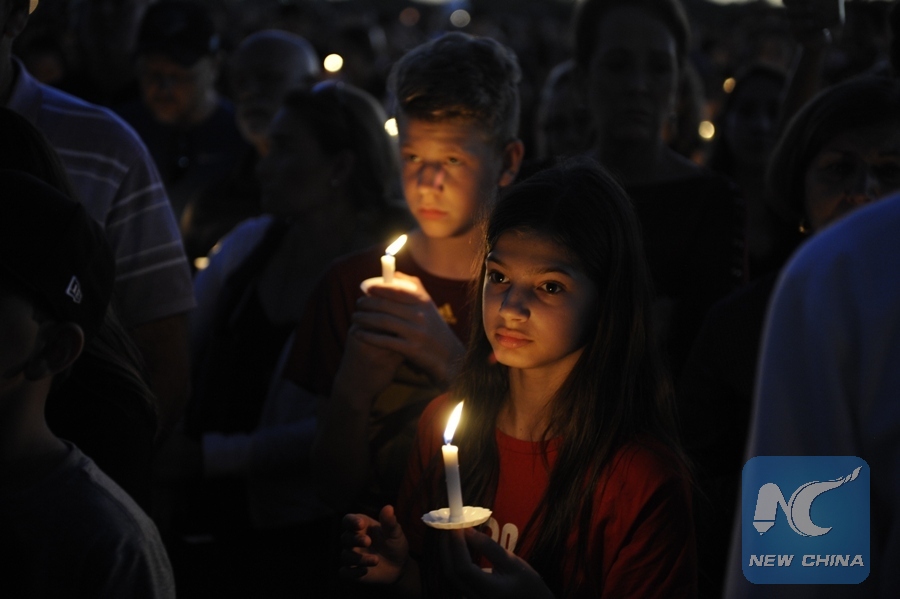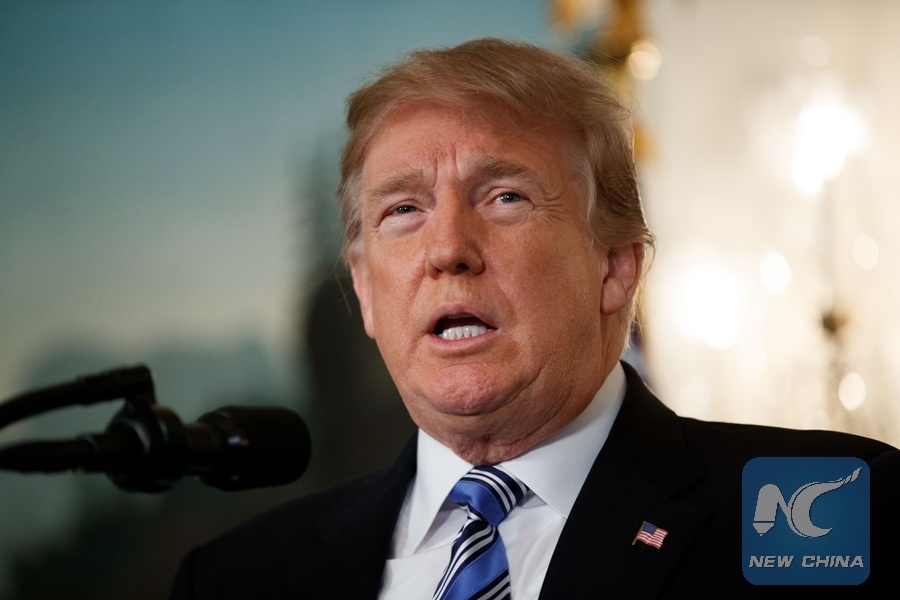
People hold candles during a vigil for the victims of the shooting at Marjory Stoneman Douglas High School, in Parkland, Florida, the United States, Feb. 15, 2018. Seventeen people were killed in a mass shooting in a high school in Florida in the United States Wednesday, local police said. (Xinhua/Liu Yang)
By Matthew Rusling
WASHINGTON, Feb. 15 (Xinhua) -- Mass killings like the one seen on Wednesday are becoming increasingly common in the United States, highlighting a problem that only seems to be getting worse, experts said.
Wednesday saw a teenage shooter go on a rampage at a Florida high school, killing 17 people. The shooting is the latest in a long list of U.S. mass killings that have occurred in recent years, underscoring an argument of whether it's the guns, sociological factors, or a combination of both that is causing so much carnage.
"Mass shootings are frequent in America because guns are so readily available. Nearly anyone who wants a gun can purchase one. That means anyone who is deranged, angry, or has terrorist impulses can find a weapon and shoot a lot of people in a very short period of time," Brookings Institution Senior Fellow Darrell West told Xinhua.
"The ubiquitousness of guns is the prime problem behind the violence," West said.

Flowers are placed on a fence near Marjory Stoneman Douglas High School to mourn for the victims, in Parkland, Florida, the United States, Feb. 15, 2018. Seventeen people were killed in a mass shooting in a high school inFlorida in the United States Wednesday, local police said. (Xinhua/Liu Yang)
Still others argue that while guns have always been easily available in the United States, the last decade has seen a rise in mass shootings.
Indeed, the last decade saw four of the deadliest shootings in U.S. history. In 2007, a student at Virginia Tech killed 32 people; in 2012 a deranged gunman entered the Sandy Hook elementary school and murdered 28 people, including many children; last year a gunman killed 49 people at a gay nightclub in Orlando. And October's Las Vegas shooting - in which nearly 60 people died and 500 were wounded -- dwarfed all three of these incidents in terms of the death toll.
Experts on mass killings say if someone is truly determined to carry out a mass murder, they will find other ways to do it if automatic weapons are unavailable, such as setting off a homemade bomb.
But advocates of gun control say stricter controls on automatic weapons could result in fewer casualties, as military-style weapons can fire hundreds of rounds in seconds, while many other weapons can only fire a few rounds before the shooter needs to reload. That could leave time for would-be victims to run away or disarm the gunman.
Experts said mass murderers can come from any socio-economic background, ethnic or other background. But there are some common patterns prevalent among individuals who commit such acts of violence.
Joseph A. Toomey, assistant professor and director of the forensic psychology concentration at William James College, told Xinhua that one common pattern is a failure to cope with loss and a response to those types of things that fits the pattern of isolation.
"They tend to be very isolated individuals," Toomey said of mass murderers. "And then when these losses occur they don't deal with them well. They become very angry, they ruminate over the losses, they externalize blame for the losses. They put the blame on those around them, or circumstances within society."
Experts said it is unlikely that U.S. President Donald Trump will make any new calls for more gun control, as the GOP has been opposed to action in this area for decades and have not been swayed by past mass shootings.

U.S. President Donald Trump speaks in a national address regarding the mass shooting in Parkland, Florida, at the White House in Washington D.C., the United States, on Feb. 15, 2018. Donald Trump said here on Thursday that he is making plan to visit shooting scene in Parkland, Florida. (Xinhua/Ting Shen)
The right to bear arms, as guaranteed in the U.S. Constitution, is seen as sacred in many rural communities in America's heartland, whose support was a major factor that pushed Trump into the White House last November. Many firearms advocates -- but not all -- are opposed to even the most basic gun control legislation, as they view that as a slippery slope that would eventually result in infringement on their constitutional rights.
Those include the right to protect oneself when there is no law enforcement close by, as is often the case in rural areas. Others note that guns protect people's homes and families when intruders break in. Americans, as a culture, are also wary of the eventual formation of a police state in which the individual has no rights, and they view the right to bear arms as key to preventing this.
West said there are many different ways that mass shootings could be prevented.
"There should be tighter background checks and those with criminal convictions or histories of mental illness should not be allowed to purchase guns," West said.
"There can be a waiting period for gun purchases. Certain weapons such as high-speed automatic weapons should be banned from sale," West said.
He added that schools need to do a better job integrating all people into their social fabric so certain people don't feel like alienated outsiders.
"Those experiencing a sense of social isolation are the ones most likely to engage in these heinous acts," West said.

Mourners hug after placing flowers on a makeshift memorial for the victims of Marjory Stoneman Douglas High School shooting in Parkland, Florida on Feb. 15, 2018. (Xinhua/AFP)
Dan Mahaffee, senior vice president and director of policy at the Center for the Study of Congress and the Presidency, said the partisan deadlock on gun issues will continue to limit the political response.
"Certainly, the impact of this tragedy is made greater by the fact that a young man with ominous behavioral and mental health warnings was able to get such a weapon. While the United States has a long tradition of firearms ownership-and many see it as a fundamental constitutional right-many want to know why it is easier to get such weaponry than to get a driver's license," Mahaffee said.

